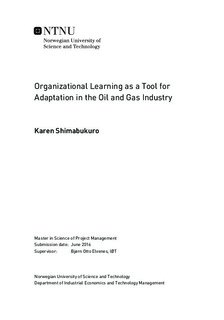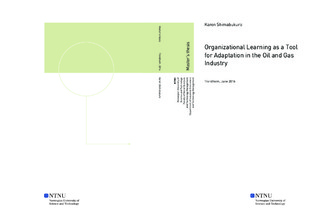| dc.description.abstract | This work addresses how organizational learning can serve as a tool for oil and gas companies in the transition process from fossil fuels to renewable energy. Considering that there are external factors (mainly from society, organizations and governments) pressuring oil companies to start combating climate change, there is a need for adaptability in this industry. Companies can address climate change in different ways, but this work analyzes the process of transformation of oil companies into energy companies by adding renewable energy to their business portfolio.
The strategy literature is reviewed in the search for ways of increasing adaptability in the oil and gas industry, and the organizational learning literature is examined to explore how oil companies can develop competences and acquire new knowledge to enter the renewable energy market. Organizational learning, in this work, is seen as a way of facilitating the transition process for oil companies. Some concepts of ways to enter a new market are also indicated, such as acquisitions and projects. A particular focus is given to projects, since this is a path usually taken by oil companies to learn when adapting to new countries and new environmental conditions.
This work is written in the context of the crisis of low oil prices experienced by the oil and gas industry. Since the most affected part of the value chain is the upstream activity, which encompasses the exploration and production of oil and gas, this is the part of the business that the work is referring to.
Finally, a theory-based framework is developed to guide the analysis of the problem and it is tested using a case study on Statoil, a Norwegian oil company, with publicly available information from the company. The conclusion is that the framework fits Statoil's strategy change to develop new opportunities in the renewable energy market. When Statoil started giving more emphasis on renewable energy, there is an increase in investment activity on offshore wind power, which is the type of renewables that is most aligned with Statoil's capabilities (especially considering that most of its upstream activities are offshore). And the company's focus on learning (both in the organizational and individual levels) can be seen as an advantage to expand their position on renewables and become an important international player in this market. | |

